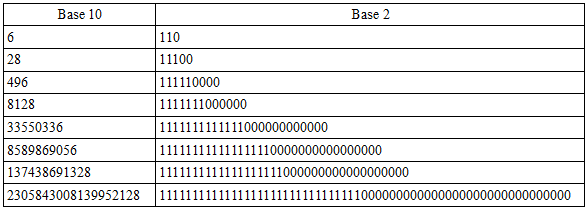A number is said to be perfect if it equals the sum of its divisors: 6 is divisible by 1, 2, and 3, and 1 + 2 + 3 = 6.
St. Augustine wrote, “Six is a number perfect in itself, and not because God created all things in six days; rather the converse is true; God created all things in six days because this number is perfect, and it would have been perfect even if the work of the six days did not exist.”
Perfect numbers are rare. No one knows whether an infinite quantity exist, and no one knows whether any of them are odd. The early Greeks knew the first four, and in the ensuing two millennia we’ve uncovered only 44 more. But they have one thing in common — they reveal a curious harmony when expressed in base 2:

